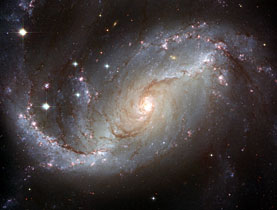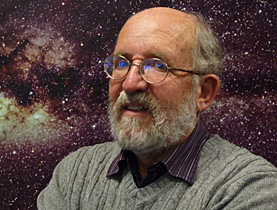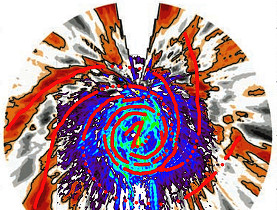Peering at the dawn of the universe

Despite entering a golden age of precision cosmology, fundamental questions about our universe remain unanswered, astronomer Simon Lilly tells swissinfo.
Lilly, professor of astronomy at the Federal Institute of Technology in Zurich, gave a keynote speech on Thursday on the importance of the Big Bang theory at the Swiss launch in Bern of the International Year of Astronomy.
Initiated by the International Astronomical Union and the United Nations Educational, Scientific and Cultural Organization (Unesco), the international year is celebrating the 400th anniversary of the work of Galileo Galilei and Johannes Kepler.
Some 180 events are being organised throughout Switzerland during the year, many by local amateur astronomy clubs, to stimulate public interest in the universe.
Lilly’s research in Zurich focuses on the formation and evolution of galaxies during the early history of the universe. He has successfully developed and applied techniques to detect and study many of the most distant galaxies known.
swissinfo: What are your expectations for the International Year of Astronomy?
Simon Lilly: It’s a great opportunity to share the excitement of astronomy with the general public.
We don’t do astronomy for commercial gain or for any great practical application, but first and foremost to satisfy our curiosity.
Because we do it on behalf of all humanity and because humanity is curious about the same things as us, we have a duty to tell people what we’re doing. The International Year of Astronomy, celebrating 400 years since Galileo’s invention of the telescope, is a marvellous vehicle for doing that.
swissinfo: The recent launch of the Large Hadron Collider (LHC), or Big Bang machine, at Cern generated huge public interest, with many people eager to better understand how the universe works. Can astronomy create similar enthusiasm?
S.L.: Yes, I certainly think it can. Of course, astronomy is much broader than what is happening at the LHC.
The level of public interest, while it doesn’t have the same huge peaks, is very strong and very sustained. You only have to look at the interest in the Rover vehicle running around on Mars or the number of hits for the Hubble Space Telescope picture archive to see that.
swissinfo: Scientists describe this as a golden age for astronomy. What’s your feeling?
S.L.: We are looking forward to the commissioning of some amazing new facilities and new missions over the next decade after ten years’ incredible progress.
For instance, I’ve been involved in Nasa’s James Webb Space Telescope, which will be launched in 2013 and sent four times further than the moon, deploying a sunshield the size of a tennis court and a four-ton mirror.
It will enable us to peer to the very furthest reaches of the universe and maybe see the early generation of stars that first lit up the universe.
swissinfo: You gave a talk today on the Big Bang theory, which you said was possibly “science’s greatest contribution to man”. How complete is our knowledge of the Big Bang?
S.L.: The story of the Big Bang – the idea of a creation event – and the fact that the universe has since evolved and we are part of that evolving universe is a story that should be told.
We are entering an era of precision cosmology, where we can measure the parameters that describe the universe as a whole with a precision that was unimaginable 20 years ago – to an accuracy of ten per cent.
But very fundamental questions remain unanswered. In particular the concept of dark energy [the cosmic antigravity force which counteracts the attractive force of gravity and which is currently thought to account for 75 per cent of the total mass-energy of the universe], which is what’s causing the universe to start accelerating.
We have ideas what dark energy might be, but none is based on standard physics. This tells us that something fundamental is missing from our view of physics.
swissinfo: What are the strengths of Swiss astronomy?
S.L.: Like most things Swiss, astronomy in Switzerland is not very big but it’s of a very high quality.
I worked for the University of Toronto, which also has about 20 astronomy professors, but the quality of the individuals and the work here in Switzerland is extremely high.
Switzerland, for instance, leads the world in work on exoplanets [planets outside our solar system]; this is one of the highpoints of this golden age of astronomy and Swiss science.
swissinfo: As a professional astronomer, what goes through your mind when you look at these stunning images of distant stars and galaxies?
S.L.: What I personally get out of being an astronomer, from my privileged professional life being able to learn about astronomy and the great advances, is a feeling of being part of the whole thing.
Life is part of the universe; it has a place in the universe. Life is an astrophysical phenomenon just the same way as the astrophysical phenomena that we see in the sun, galaxies and universe as a whole. It’s all about putting our own existence into context – this extraordinary universe we live in.
swissinfo-interview: Simon Bradley
More than 140 countries are celebrating 2009 as the International Year of Astronomy with events and activities designed to generate interest in the universe.
Launched by the International Astronomical Union and Unesco, Switzerland’s national opening ceremony was held in Bern on February 5.
The organisers are celebrating the 400-year anniversary of Galileo Galilei’s first use of an astronomical telescope and the publication by Johannes Kepler of Astronomia Nova, a tract which laid out the fundamental laws governing the movement of the planets.
Some 180 events are being organised in 15 different cantons, many by local amateur astronomy clubs. These include:
– April 2-5: “One hundred hours of astronomy” where adults and children will be able to observe the night skies using a telescope.
– September 12: Astronomy night, highlighting the protection of the dark night sky.

In compliance with the JTI standards
More: SWI swissinfo.ch certified by the Journalism Trust Initiative













You can find an overview of ongoing debates with our journalists here . Please join us!
If you want to start a conversation about a topic raised in this article or want to report factual errors, email us at english@swissinfo.ch.